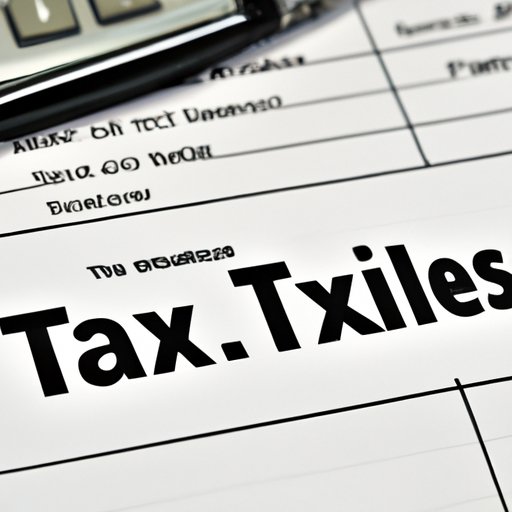
Introduction
Filing your taxes on time is an important part of responsible financial management, and one that can impact your credit and borrowing ability down the line. In this article, we explore how long you have to file taxes, the consequences of filing late, and strategies for meeting important filing deadlines.
The Legal Timeframe for Filing Your Taxes: What You Need to Know
The Internal Revenue Service (IRS) requires all U.S. citizens and resident aliens to file a tax return each year. The legal timeframe for filing your taxes is a window that opens on January 1st and closes on Tax Day, which is April 15th for most taxpayers. While these are the most common tax filing deadlines, there are a few exceptions to consider.
It’s important to note that filing taxes and paying taxes are two separate things. Tax payments are typically due by April 15th, but if you cannot pay your taxes in full by this date, you can still file your return and set up a payment plan with the IRS to avoid any late fees.
It’s also important to know if you are required to file taxes at all. This varies depending on factors like your age, income, and filing status, but generally, if you’re a U.S. citizen or resident alien and made more than a certain amount of income in the past year, you are required to file taxes.
Avoiding Late Fees: Understanding Tax Filing Deadlines
If you miss the tax filing deadline, you may incur a late fee and interest charges on any taxes that you owe. The late fee is calculated based on a percentage of the unpaid taxes owed, and it accrues daily until you either pay your taxes or file your return. Additionally, if you file your taxes more than 60 days after the deadline, you will be charged a minimum penalty of $435 or 100% of the unpaid tax, whichever is smaller.
To avoid incurring these late fees, it’s important to understand what constitutes a late tax return. If you file your taxes even one day after the deadline, it will be considered late. Additionally, filing an extension will only extend the time you have to file, not the time you have to pay any taxes owed.
How Long Do You Have to File Your Taxes? An Overview of Important Dates
As mentioned earlier, the most common tax filing deadline is April 15th. However, there are several exceptions to this deadline:
- If you live and work abroad, you have until June 15th to file your taxes.
- If you cannot file your taxes by the deadline, you can file for an extension, which gives you an additional six months to file. However, this does not extend the time you have to pay any owed taxes, and you may incur late fees and interest charges in the meantime.
- If you live in a federally declared disaster area, you may be eligible for an extended filing deadline. Check with the IRS to see if this applies to you.
If you do miss the tax filing deadline, there are ways to file your taxes late without receiving penalties. For example, if you are due a refund, there is no penalty for filing your taxes late. However, if you owe taxes, it’s important to file your taxes as soon as possible to avoid further penalties or legal action from the IRS.
The Consequences of Filing Late: Why Meeting Tax Deadlines Matters
There are several consequences to filing your taxes late, both financial and legal. First, you will incur late fees and interest on any unpaid taxes. Additionally, a late tax filing can impact your credit score and future borrowing ability, as lenders may view you as less financially responsible. Finally, if you consistently fail to file your taxes, the IRS can take legal action against you, including wage garnishments and asset seizures.
Tips for Filing Your Taxes on Time: Strategies for Meeting the Deadline
To avoid the risks associated with a late tax filing, there are several strategies that you can use to stay on top of your taxes:
- Keep accurate records of your income, expenses, and other financial paperwork throughout the year to make tax filing easier.
- Use tax software or online resources, like the IRS website or the MyTax site, to simplify your tax filing process and ensure that you file on time.
- If you’re unsure about how to file your taxes or have more complex tax needs, consider hiring an accountant or tax preparer to assist you.
Conclusion
Filing your taxes may seem like a daunting and confusing task, but it’s an important part of maintaining your financial health. By understanding the legal timeframe for filing taxes, the consequences of filing late, and the strategies you can use to meet important deadlines, you can ensure that you stay on top of your taxes and avoid any associated fees or legal action.
To file your taxes with confidence, start by keeping accurate records, using online resources or tax software to simplify the process, and seeking out professional assistance if needed. By staying up-to-date on your taxes, you can maintain your financial stability and ensure that you’re in good standing with the IRS.





